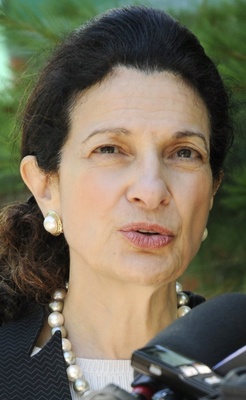WASHINGTON – President Obama has signed legislation that aims to protect the decorum of military funerals by requiring protestors to stay farther away and doubling the “quiet time” before and after the services.
U.S. Sen. Olympia Snowe, R-Maine, proposed the additional restrictions after the Supreme Court ruled last year that the anti-gay protests staged at military funerals by the Kansas-based Westboro Baptist Church were protected free speech.
The provisions of Snowe’s Sanctity of Eternal Rest for Veterans Act were in a larger veterans bill that the president signed Monday.
Snowe has credited Zachary Parker, a former Searsport District High School student, with helping to inspire her and other lawmakers with his months-long campaign to curtail protests near funerals for military personnel.
“Those who fight and die in the service of our country deserve our highest respect, and I am pleased my legislation has now been signed into law,” Snowe said in a written statement. “Protests that encroach upon the funerals and burials of our fallen soldiers are repugnant and inappropriate — and they undermine the respect military families and their loved ones undeniably deserve.”
The new law increases the buffer zone near military funerals from 300 to 500 feet, doubles the buffer zone near the access point to funerals to 300 feet and establishes a two-hour quiet period before and after the services.
The new restrictions made up a small part of the omnibus veterans affairs bill, but during Monday’s Oval Office signing ceremony, the president singled out the so-called SERVE Act and language intended to address a longstanding controversy at Camp Lejeune, N.C.
“The graves of our veterans are hallowed ground,” Obama said, according to a release from the White House. “And obviously we all defend our Constitution and the First Amendment and free speech, but we also believe that when men and women die in the service of their country and are laid to rest, it should be done with the utmost honor and respect.”
Parker, who is now a college student in New Hampshire, attended the bill’s Senate committee hearing in Washington, D.C. He said Monday that he is pleased that the changes have been signed into law, nearly two years after he began working on the issue as part of a school project.
Parker, who hopes to make a career out of the military, said he understood the concerns about restricting free speech but he believes that veterans’ families have the right to hold funerals without disruption.
He said the SERVE Act addresses the timing and buffer zones of protests without infringing on the First Amendment. “If they think it is restricting people’s rights, then they need to read the bill,” he said.
Members of the small but vocal Westboro Baptist Church movement have protested funerals across the country, including at least one in Maine, claiming that wartime deaths are God’s punishment of the U.S. for tolerating the “sin of homosexuality.”
Members told CNN recently that they would continue the protests but would comply with any new restrictions.
The bill signed by the president also:
• Provides medical care to Marines or their family members who were sickened by contaminated water at Camp Lejeune during a 30-year period.
• Directs the U.S. Department of Veterans Affairs to enter into contracts with state-affiliated veterans homes to set more accurate reimbursement rates for care provided to severely disabled or elderly veterans.
U.S. Rep. Mike Michaud, D-Maine, sponsored that language, in response to concerns that veterans homes in Maine and elsewhere were not being reimbursed adequately.
• Requires veterans’ medical facilities to better track and report sexual assaults.
Washington Bureau Chief Kevin Miller can be contacted at 317-6256 or at:
kmiller@mainetoday.com
Twitter: @KevinMillerDC
Send questions/comments to the editors.




Comments are no longer available on this story